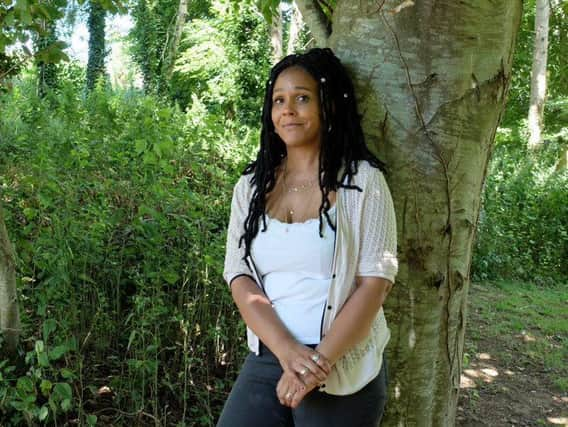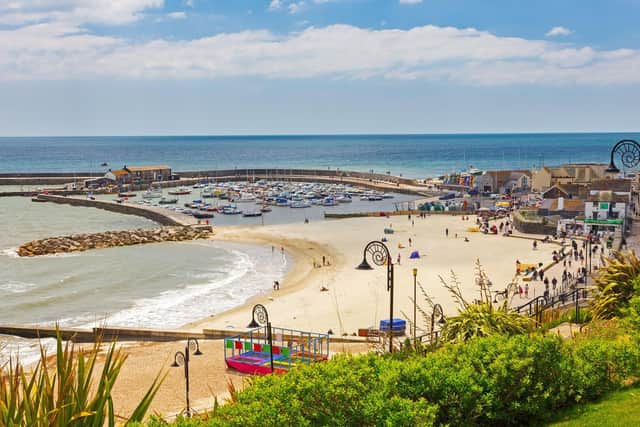Doncaster-born poet Louisa Adjoa Parker on mental health and grief in her new collection


Yorkshire-born poet Louisa Adjoa Parker was convinced that her late beloved friend was visiting her in the form of a bird.
While she says that grief can make you feel “mad”, for a creative person such as herself, the most constructive way for her to make sense of these experiences was to get it all down on the page.
Advertisement
Hide AdAdvertisement
Hide AdLouisa, who lived in Doncaster until she was six (about the age she started writing), isn’t the first poet to give humans the qualities of nature.


But Louisa hopes that her latest collection, She Can Still Sing, can add to the growing national conversation about mental health, and grief in particular.
The collection is all about her friend Natasha Rajaratnam, who took her life in January 2019 after struggling with mental ill health.
The first poem, Birds, opens with the line: “Are you the blackbird with a custard-yellow beak and blue-black feathers the exact shade of your hair, who hops down from a bramble hedge lands at my feet, as though to greet me?”
Advertisement
Hide AdAdvertisement
Hide AdBut wasn’t a matter of artistic licence or pretension, says Louisa – she really thought it was her.
“I absolutely felt like I could see my friend. I know it sounds a bit nuts, but I actually thought that she was the bird that I saw.
“You do go a bit mad with grief, I think, sometimes.
In one of the poems I’m talking about ‘the light’. I’ve been through grief, sadly, unfortunately, too many times for someone of my age, but I think I always end up drawn to looking at the sky and looking at birds and seeing birds in flight and seeing flowers and seeing animals.
“I just feel kind of very drawn to that when I’m going through that sort of grief process.”
Advertisement
Hide AdAdvertisement
Hide AdHer family left Doncaster, first for Cambridgeshire and eventually to Lyme Regis in Dorset, Louisa’s mother and father split up, then her and Natasha’s parents were briefly in a relationship.
The pair, then 19 and 16 respectively, developed a step-sister relationship, and though their parents broke up, the friendship lasted for many years.
Louisa, 48, says: “With a lot of my work, I have focused quite a lot on the on the dark side of stuff.
“I do write a lot about quite distressing themes, I write about racism and addiction and death, and I’ve written about suicide in kind of graphic detail.
Advertisement
Hide AdAdvertisement
Hide Ad“But with this collection, because I wanted to honour my friend, I didn’t want to sort of show any of the difficulty or the darkness,” she says.
“I wanted to just show the beauty and the light. And I wanted to really focus on that in the hope that it will be a positive and in the hope that it will encourage people who are grieving to understand that you can find the joy in the memories. Because at first it feels like you can’t, it feels as though it’s just too distressing and unbelievable to get your head around. But I think that, you know, there is always that possibility that we can find joy in the memories even straight away.”
She adds: “My focus, really, was to look at the light and the beauty and this amazing friend who had such an interesting life. I mean, she’s half-Malaysian Indian and half-Swiss, and lived in Dorset, and she’s been all over the world. She’s just kind of a really interesting, amazing person.”
The collection is dedicated to Natasha’s daughter, Leonie, who gave her blessing for the poems to be released.
Advertisement
Hide AdAdvertisement
Hide AdIf there is a message that Louisa wants people to take, it is that there needs to be more support for those who are struggling mentally and that society at large needs to understand that “poor mental health can destroy lives”, she says.
“Overall, I don’t think as a society we talk about mental health enough. I know it’s got better, I know that celebrities talk about it and it’s more acceptable, but I still don’t think that as a society, we kind of understand how debilitating mental health can be, and also how debilitating grief can be.
“I think when people haven’t been through it, they’ve got no clue what it’s like, for a start. And I think that grief, in a way, is kind of like a separate part of mental health that deserves more support, more consideration,” she says.
“I think as British people we don’t really want to think about death. But unfortunately it happens and it would probably be more healthy if we did talk about it a bit more and have more understanding that loss is really, really tough. It’s a really tough human experience.”
We could also be preparing children for it more, she says.
Advertisement
Hide AdAdvertisement
Hide AdLouisa’s poetry has previously been highly commended by the Forward Prize, twice shortlisted by the Bridport Prize, and another of her grief poems, Kindness, was commended by the National Poetry Competition 2019.
In the past she has delivered writing workshops for people from various walks of life, including children and prisoners.
Outside of poetry, she works as an equality, diversity and inclusion consultant, and is co-director of The Inclusion Agency, a community interest company championing equality in the arts, heritage, education and other sectors. She has been “inundated” with requests since the murder of George Floyd in the US last year.
Louisa has also written widely about ethnically diverse history in rural Britain.
Advertisement
Hide AdAdvertisement
Hide AdHer father came to England from Accra, Ghana, in the 1960s and met her white British mother.
Louisa’s grandparents originally opposed their marriage, but relented and turned up at the wedding and accepted their grandchildren.
She says: “I think my gran, bless her, imagined me sat on my own on my birthday with no kids coming round because I was mixed-race. She kind of really imagined a difficult situation.
“But in many ways they were right, because it was really tough. And I remember being in Yorkshire and later in Huntingdon, the racist abuse was awful.
Advertisement
Hide AdAdvertisement
Hide Ad“But as a little kid, you just accept it because that’s all you know. So there’s all the normal, horrible racial slurs, not just from kids but from adults as well.
“It does impact your sense of self, it does impact your mental health because it just doesn’t feel very safe. You’d never know if someone is going to be racist. That was kind of my experience as a child and young woman. If I was meeting someone it’s like ‘Oh, will they be racist or will they be okay?’ And it was always that expectation.
"So it was really tough and I think that I escaped into words and by also being very sociable, and sort of trying to make friends – even though my friends were racist – I still managed to make loads of friends throughout my life, so that was, I guess, my coping strategy.”
She Can Still Sing is available now from flipped eye publishing for £4.
Family support
Advertisement
Hide AdAdvertisement
Hide AdLouisa’s collection is one of three released this summer by flipped eye publishing, which has also brought out works by Eleanor Penny and Maia Elsner.
In her acknowledgements for She Can Still Sing, which came out last month, Louisa thanked her late friend Natasha Rajaratnam for “enriching mine, my family’s, and so many other people’s lives with your light and friendship”.
Still based in south west England, Louisa is married to Peter Fry and has three daughters: Keziah, Jessie and Alicia; and grandchildren Maya, Leila, Harrison and Billy.
Her previous collections include Salt-sweat and Tears, How to Wear a Skin, and a short story collection, Stay With Me. She is also working on a “coastal memoir”.